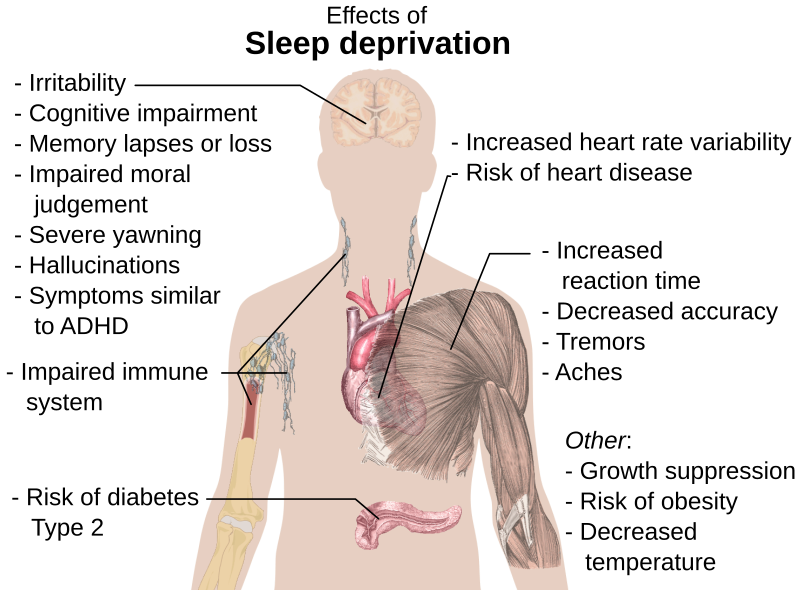5 Graphs to Show Why Americans Have Become Much Less Healthy in the Past 50 Years
Sleep deprivation is pretty common these days—it's a major attribute of achievement-oriented societies—but why would anyone have a honey-detest relationship with it? Usually, one would say,sleep deprivation and all the accompanying symptomsare the definition of a honey-hate relationship, to the core.
Let me tell yous something: you canutilise sleep deprivation for your own do good. We'll become into how this works, just first, allow's talk over the phenomenon of sleep, sleep deprivation and its symptoms, and finally design a "how to" experiment about slumber deprivation(commonly known as cocky-torture), and ask ourselves, more importantly, why?
Sleep: Functionality
"Sleep is a naturally recurring state characterized by reduced or absent consciousness, […] and inactivity of most all voluntary muscles." (Macmillan, 1981). This is a curt and articulate explanation:
- sleep is characterized past sleep stages/cycles (5 cycles, differing in depth)
- the deeper your sleep, the meliorate the quality of sleep
- More Sleep ≠ Better (salubrious avg. 7.5-9 hours)
The functions of sleep are very multifaceted and majorly unexplored, but these (validated, and commonly accustomed) aspects interest us the most right now. Sleep has a major impact:
- on our memory and the ability to re-organize thoughts, experiences and to learn new things (neuroplasticity)
- on the regulation of necessary hormones and the ability of our body to regenerate physically
What is Slumber Deprivation?
Slumber deprivation is the lack of sleep: either it was acquired past a very superficial and brusque sleep (over a menstruum of some days) or by no slumber at all. The functionality and benefits of slumber are limited every bit a result (meet above), and we might face someserious problems, if we stay slumber-deprived for a prolonged catamenia of time.
The effects of sleep deprivation are diverse; some occur instantly afterastute deprivation, other occur simply afterchronic deprivation:

(past Mikael Häggström, Wikimedia Commons, 2009)
After astute deprivation:
- irritability
- cognitive harm
- memory lapses
- restricted judgement
- severe yawning
- increased heart-rate variability, increased reaction fourth dimension and decreased accurateness
- temporary emotional instability
After chronic deprivation:
The effects of chronic deprivation boil downwards to the evolution of diverse diseases, such equally:
- Diabetes
- heart affliction
- growth suppression
- restricted immune organisation functionality
- weight gain/loss
- low
Due to the diversity of astute deficits, slumber deprivation has been used as a successful interrogation technique. In fact, the U.S. military authorised sleep impecuniousness as an interrogation method (Leave no Marks: Enhanced Interrogation Techniques and the Risk of Criminality, August 2007).
But hey, why would there be alove-hate relationship hither? What's the do good for us?!
How To (..and the benefits of sleep deprivation?!)
The effects of slumber deprivation on the human torso were observed and analyzed in the 70s: the methodological monitoring involved blood assay, merely also neuropsychological instruments to capture the encephalon activeness during sleep-deprivation and duringrecovery slumber later on deprivation.
The results:"There'south evidence of antidepressive effect after sleep deprivation."As a matter of fact, subjects experienced a37.2 % improvement in their mood!
The background of these results are diverse—the reasons behind the remarkable mood improvement are, amongst others:
- biochemical investigations proved an increase of different hormones, including serotonin and noradrenaline, which are also known to roleas a happiness hormone (serotonin) and stimulating hormone (noradrenaline)
- improved sleep continuity and depth in the night afterwards sleep deprivation
These mentioned effects take action in depressedonly besides non-depressed people,pregnant that you can stay awake for a night, begin the next day as you lot usually do and try to keep yourself awake (that's not very piece of cake!) and go to bed quite early → sleep similar a baby → wake up the side by side morning time withmore ability and energy.
By depriving yourself of sleep, youset your biological clock to zero— in case your time management is messed up and running out of fuel, this can very helpful (a dear-hate relationship). You can phone call sleep deprivationslumberhacking: at offset we abstain from slumber, and later (during the recovery nighttime) we sideslip into a very deep state of sleep, which will regenerate usa.
Admittedly, sleep deprivation amid healthy people is frequently met with skepticism, mainly because healthy subjects can regulate their sleep pattern in other ways (through diet, sleep hygiene and sleep rituals). On the other hand, sleep impecuniousness is free of any serious side furnishings and tin can serve as a quick set up. Hither's a short how-to:
- Perform your sleep deprivation "experiment" on the weekend (working in a slumber deprived state can be difficult)
- Keep yourself awake during your sleep impecuniousness nighttime (and the following day) with the help of tea or coffee, but please don't overdo it
- Get to bed early your sleep-deprived 24-hour interval, and bask your deep recovery night (7.five – 9 hours)
- Wake upwardly powerful and energized, feeling like a million dollars
After your sleep deprivation experiment you should take intendance of a well-counterbalanced nutrition and good sleeping habits—do non regress to one-time, negative tendencies. Slumber deprivation for a night can be applied hands, is highly constructive and free of serious side effects. Have you already tried it? Share your experience with us!
Featured photograph credit: Lux Graves via unsplash.com
Source: https://www.lifehack.org/484644/5-graphs-to-show-why-americans-have-become-much-less-healthy-in-the-past-50-years
0 Response to "5 Graphs to Show Why Americans Have Become Much Less Healthy in the Past 50 Years"
Post a Comment